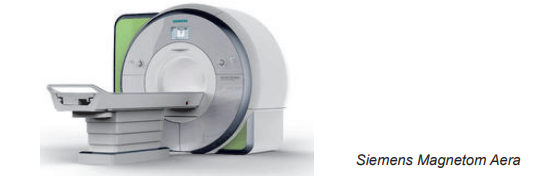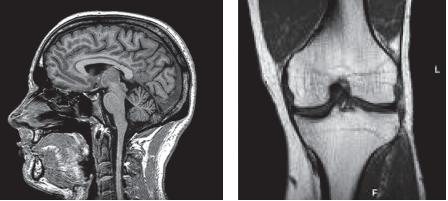MRI (Magnetic Resonance Imaging)
Download and print as a PDF
DownloadWhat is MRI?
Magnetic Resonance Imaging is a type of scan that uses strong magnetic fields and radio waves to produce diagnostic images of the internal organs and structures of the body. An example of an MRI scanner is seen below. The patient lies inside the scanner during the examination and is given ear protection to minimise the effects of the noise which the scanner makes. Headphones are available through which music may be played. You may bring along your own CD/Mp3 player if you wish.

There is no use of radiation or X-rays, however, MRI scans are not suitable for everyone. You will receive a safety questionnaire along with your appointment letter to ensure that you meet the safety standards before entering the MRI scanning room. There are no known risks to having an MRI if you meet the safety standards.
Visitors to the MRI department will be looked after by radiographers and healthcare assistants who work as a team to provide a safe and caring service. The radiographers performing the scan can see you at all times and you will be given a contact buzzer which you can push at any time if you are experiencing any problems. Before leaving the room to perform the scan, the radiographer will ensure you are comfortable and that you are happy with all instructions given.
It’s important to keep very still during the scan. Scan times vary according to the body part being imaged.
Why do I need an MRI scan?
MRI produces high quality images of most parts of the body. These include:
- Brain and spinal cord
- Heart
- Muscles, bones and joints
- Breasts
- Blood vessels
- Abdominal and pelvic contents
The results of the scan are used to help in the diagnosis of conditions,plan treatments and evaluate how effective previous treatment has been.

Examples of MRI scans – brain and knee joint
Preparing for your scan
Different MRI scans require different types of preparation. Details on how to prepare for your scan are explained in your appointment letter.
Please follow these instructions carefully, or the radiographer may not be able to complete the scan.
Before arriving in the department it is advisable to remove as much jewellery as possible.
You may be asked to change in to a hospital gown. Discrete changing facilities are available with secure lockers provided to store clothes and personal effects. N.B. a £1 coin is required for these lockers, but
is returned when you remove your personal effects. Mobile phones and wallets/handbags must be stored in these lockers as they cannot enter the scanner room.
Many scans require the injection of either a contrast dye or anti-spasmodic drug into a vein in the arm/hand. Appointment letters will indicate whether this is necessary and a full explanation will be given by the staff in the MRI department.
Some scans require you not to eat or drink for a set time before the examination. This information will be included in your appointment letter - please read the letter carefully.
If these dietary instructions cause concern for any reason please contact the Imaging Department on the numbers provided at the end of this leaflet.
Please inform staff in the imaging department if you may be pregnant.
Some patients may feel apprehensive or have had previous experiences of MRI and may feel some anxiety. Our staff are there to offer support and reassurance and are happy to address any of your concerns. All the MRI scanners at the Royal Sussex County Hospital were recently installed in 2015. They are shorter, wider and offer more space and light within the scanner than older models.
If you have vision, mobility or access issues, or have any questions, please contact the Imaging Department on 01273 523040
Opening hours 08.00 – 18.00 Monday to Friday
After your scan
The results of the scan will not be available immediately. The MRI images will need to be viewed and reported by a radiologist. The report will then be sent to the doctor who arranged for you to have the scan.
What other options are available to me?
If you choose not to have MRI for any reason, the doctor who referred you will be informed and can decide if another form of imaging may be appropriate.
You can find out more information about MRI scans on the Nhs.uk website.
This information is intended for patients receiving care in Brighton & Hove or Haywards Heath.
The information here is for guidance purposes only and is in no way intended to replace professional clinical advice by a qualified practitioner.
Review Date: October 2022


